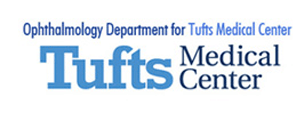Laser Treatment for Vision Loss from Branch Retinal Vein Occlusion
is Safer than Corticosteroid Injections
Study shows that Laser Treatment is both safer and equally effective
FOR IMMEDIATE RELEASE
Boston, MA. September 15, 2009 – New England Eye Center is pleased to announce that Scientists have found that laser therapy is equivalent to two different dosages of corticosteroid medications for treating vision loss from the blockage of small veins in the back of the eye, a condition known as branch retinal vein occlusion (BRVO). Furthermore, laser treatment was shown to have fewer complications for patients.
Caroline Baumal, MD
This research was part of the Standard Care vs. Corticosteroid for Retinal Vein Occlusion (SCORE) Study, a phase III clinical trial conducted at 84 sites and supported by the National Eye Institute (NEI) at the National Institutes of Health in which Caroline Baumal, MD an Ophthalmologist for New England Eye Center at Tufts Medical Center participated in as a Principal Investigator. New England Eye Center is the only eye care institution in Massachusetts that participated in this study.
“As a result of the SCORE study results for the blockage of a branch of the retinal vein, there are more viable treatment options now available including laser or intravitreal steroid injection. The treatment choice may vary depending on the clinical circumstances in the individual,” said Caroline Baumal, M.D., Assistant Professor at the Tufts University School of Medicine and a Principal Investigator of the SCORE study.
In the United States, vein occlusion is estimated to be the second most common condition affecting blood vessels in the retina. In BRVO, a blood clot slows or stops circulation in a small vein within the eye’s light-sensitive retinal tissue. This may lead to new blood vessel growth and blood vessel leakage, which results in retinal tissue swelling—a common cause of vision loss from BRVO.
Eye doctors typically treat BRVO with laser therapy applied to the affected retina in a grid pattern. However, some ophthalmologists have treated people who have BRVO using eye injections of an anti-inflammatory corticosteroid called triamcinolone. Because clinical observations suggested a visual benefit, the SCORE study was initiated to compare the safety and effectiveness of standard care laser treatment with two different doses of triamcinolone—1 milligram and 4 milligrams. The results appear in the September 2009 issue of Archives of Ophthalmology, published alongside findings from a separate trial within the SCORE study, which looked at blockages in larger retinal veins.
Participants in the study included 411 people with BRVO who were an average of 67 years old. Patients could receive treatment every four months for up to three years. One year after patients began the trial, equal numbers of patients experienced visual improvement in each treatment group. Twenty to 30 percent of patients in each group experienced substantial visual gains of three or more lines on a vision chart—equivalent to identifying letters that were half as small as they could read before treatment.
However, patients who received either a dosage of corticosteroid medication were more likely to develop a cataract or have an increase in eye pressure requiring medication than patients who received laser treatment. Between one and two years after treatment was begun, patients who received the 4-milligram dosage were also more likely to undergo cataract surgery.
“These results may have a significant public health impact by providing guidance for clinicians and patients in their selection of a branch retinal vein occlusion treatment,” said Frederick L. Ferris III, M.D., clinical director of the NEI. “Still, better treatments for this condition are needed. This information could guide future clinical trials of new and more effective treatments for BRVO patients.”
The SCORE study was co-chaired by Michael S. Ip, M.D., associate professor at the University of Wisconsin, Madison, and Ingrid U. Scott, M.D., M.P.H., professor at Penn State College of Medicine. Find more information about this clinical trial (NCT00105027) at www.clinicaltrials.gov.
# # #
New England Eye Center
The New England Eye Center (NEEC), is the ophthalmology department at Tufts Medical Center, a major academic and tertiary referral medical center, seeing approximately 85,000 patient visits per year and providing the highest quality tertiary ophthalmic services with referrals from all over the world. Drs. Adam Rogers, Jay Duker, and Elias Reichel, members of the Vitreoretinal Service at New England Eye Center, were the first investigators to report the use of intravitreal steroids in the treatment of central retinal vein occlusion in February 2002. (Intravitreal triamcinolone acetonide for macular edema due to central retinal vein occlusion. British Journal of Ophthalmology. 2002 Feb; 86(2): 247-8.) During the last three years, New England Eye Center physicians have led or participated in approximately 30 clinical trials and currently, more than a dozen clinical trials are underway. For more information about the New England Eye Center, go to www.neec.com.
National Eye Institute
The National Eye Institute (NEI), part of the National Institutes of Health, leads the federal government’s research on the visual system and eye diseases. NEI supports basic and clinical science programs that result in the development of sight-saving treatments.
National Institute of Health
The National Institutes of Health (NIH)—The Nation’s Medical Research Agency—includes 27 Institutes and Centers and is a component of the U. S. Department of Health and Human Services. It is the primary federal agency for conducting and supporting basic, clinical, and translational medical research, and it investigates the causes, treatments, and cures for both common and rare diseases. For more information about NIH and its programs, visit www.nih.gov.
# # #
Contact: William R. Sacco, New England Eye Center
(617) 636-1055 or [email protected]
Contact: National Eye Institute (301) 496-5248




